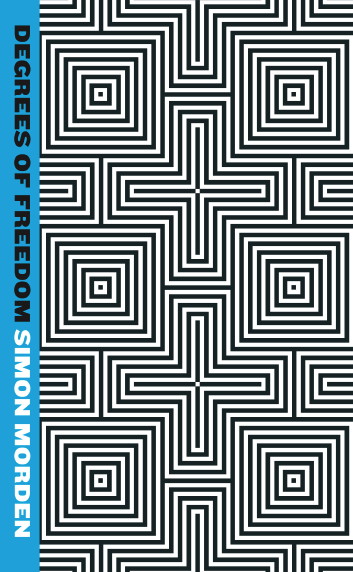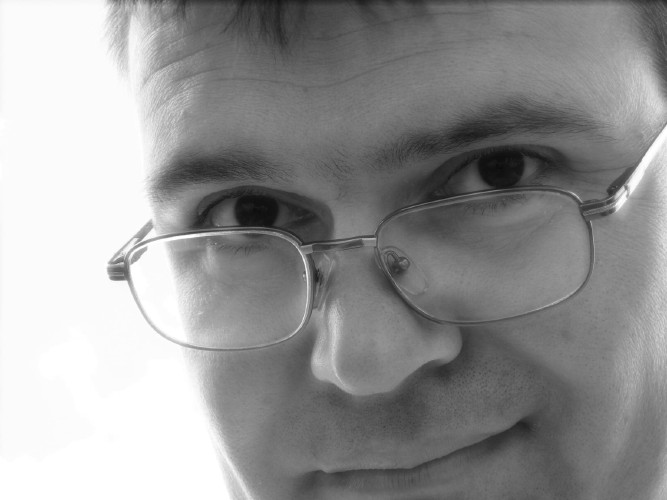NEW AUTHOR: Simon Morden
None
The Metrozone writer talks Equations Of Life and Degrees Of Freedom

A real-life scientist, former editor of SF mag Focus , househusband and teaching assistant, Simon Morden has written short stories and kids’ book The Lost Art . Degrees Of Freedom , the third book in his Metrozone trilogy, is out now from Orbit (the previous books, Equations Of Life and Theories Of Flight , have been published over the last couple of months). This is an extended version of the New Author interview that appeared in SFX 208.
You’ve written short stories before, but Equations Of Life was your first published adult novel. Had you written lots of unpublished novels before this, or did you crack it straight away with this one?
I’m aware that some “people” appear to be able to write a novel-length manuscript, get an agent, sign a lucrative contract and become wildly successful, all at the first attempt. Such “people” should be hunted down and made to suffer like the rest of us talentless hacks who have drawers full of unpublished and unpublishable novels. I wrote my first novel in 1990. It took another eight years to even get a short story published. I think there’s something in the “ten thousand hours” theory – that mastery of a skill or subject is the result of the amount of practice you’re willing to put into it, whether it’s a musical instrument (as the murdering of ’60s and ’70s hits on my guitar will testify), sport, or a craft like writing. Ten thousand hours. Half a million words. Some of them were even good.
Did you find short stories a good training ground for longer fiction?
Yes, though paradoxically, I’d written a novel-length manuscript before I’d ever tried the shorter form. I love the short story: every word has to be finely judged, every scene meaningful, every story complete. No waffle, no losing your way, nothing wasted – a short story ought to be the embodiment of the storytellers’ art. And it’s certainly affected the way I tell longer stories. I tend to write chapters of between two and four thousand words, and I make sure that every single one has a point to it: either something is about to happen, something’s happening, or something’s just happened. All the Metrozone novels were written like that. It makes them fast, and at times, furious reads. They’re also mercifully normal-sized, so you can actually carry them around with you without needing to go weight training first.
Are the novels significantly different to what you originally pictured in your mind?
Assuming, of course, that I plan these things out beforehand – which I don’t. For Equations of Life , I had a pretty good idea of where I was starting from, and what happened next. The rest of it was made up as I went along – real seat-of-the-pants stuff. I think it turned out quite well, all things considered. Which means, of course, I had absolutely no idea how Theories Of Flight would even begin, where it would go, and how to get there. Degrees Of Freedom was a mere twinkle in my eye. The thing being, if I’m excited to find out what happens next, that excitement comes out on the page. Admittedly, it is a bloody stupid way to write, as success is far from certain: but that’s what it’s like for us authors, living permanently on the edge between triumph and disaster. Gnarly, dudes.
Did you always envision the story as a trilogy?
There’s something archetypal about a series of three – even the Greeks used to put on their plays in groups of three – and in the SFF publishing world, it’s much easier for a newbie to place three books than it is to sell just a single novel. It shows you’re not just a one-hit wonder, which if you’re a publisher spending good money to market an unknown author, is an important consideration. So trilogies combine both the artistic and commercial. There’s an obvious question though, that if I didn’t know how the books would turn out, how did I pitch them? I sort of made that bit up too… shhh.
Get sneak previews, exclusive competitions and details of special events each month!
You’ve edited Focus and been on the judging panel for the Arthur C Clarke Award, so you’ve obviously read a lot of science fiction. Is that a help or a hindrance?
I’m pretty much the boy that science fiction built, having read very little else from the age of ten or so. I haven’t read as much new stuff as I’d like, but I’ve got or read lot of the older books and collections from the ’90s and earlier. So I know a fair amount of what’s gone before, and yes, that does mean that I know if I’m borrowing an idea from somewhere to recycle in a plot that I’m devising. But self-awareness doesn’t necessarily lead to worry – because there are a limited number of plots (various estimates include seven, 33 and 45), someone will have already used that never-thought-of-before idea you just had. It used to always be Shakespeare, but these days it’s more likely to be Charlie Stross.
Remember, kids: stealing from one source is plagiarism. Stealing from many is research. And as a scientist, I love research…
Have you developed the world of your novels much beyond what appears on the page?
There’s a massive backstory to the world of the Metrozone. I wrote a series of short stories – 10 longish ones, 10 shorter – all set during and after Armageddon (as I call the brief but intense period of nuclear terrorism between 2001 and 2007. It’s an alternate future with an alternate past) that was published way back in 2002. Despite some continuity issues, which I might go back and sort out at some point, I use the events in those stories to set up Equations Of Life and everything that follows. The stories are online, for free, at my website .
The world they create is compelling and rich enough to return to. There’ll be more Petrovitchy goodness at some point (publisher willing). I’ve always wanted to do a mil-sf space opera thing in the vein of Haldeman and Pohl, so that’s on the cards. I’ve threatened to do a fantasy, too, just to see if I can. I’m led to believe they can be quite popular.
You’ve got a science background. Is it important to you that science fiction should get the science fact correct?
Yes. It bugs the hell out of me – probably far more than it should – if someone screws up the science, especially when the plot hinges on it. I’m probably offering myself up as a hostage to fortune here, as the Metrozone series does include some outrageously leftfield experiments (in between all the shooting and explosions), but even if I’m making it up, it has to be both internally consistent and mesh with the real world stuff that we know about. I cannot believe for one moment that fantasy authors don’t have files of notes detailing exactly how their magic systems work. Anything else would be just wrong, surely.
If you were writing a review of your own books and you could choose any three other SF authors that you’d really want be compared with, who would they be and why?
I’m looking at my shelves, and there are so many good writers there. But if you were going to force me to choose, I’ll have Ray Bradbury, Julian May and Michael Marshall Smith.
Bradbury is a writing god. Something Wicked This Way Comes is my favouritist book ever, but there’s also Fahrenheit 451 , The Martian Chronicles , The Illustrated Man … this is the guy who wrote “A Sound of Thunder”. He has the ability to turn a whole story on a single phrase, his lyrical prose and poetic cadence is unmatched. Simply, a wonderful storyteller. When he goes – I suspect he’s got a few more years yet – the world will be a darker, more mundane place.
Julian May’s Saga Of The Exiles/Galactic Milieu series is an astonishing body of work. The whole style and tone of the series has been a huge influence, but as a non-planner, I’m simply in awe of the way she controls the arc of the plot over eight books (in the UK) to bring everything back to the start again. She could have just got lucky, but it looks very much like talent to me.
I’m picking someone younger, just so that all my writing heroes don’t die on me at once (May’s eighty this year, and Bradbury will be 91. 91!). Michael Marshall Smith is another terrific teller of tales. There’s always profundity squirreled away behind the verve and wit of his work, and he writes with real passion and feeling. Spares is fantastically angry in a way that Ishiguro’s Never Let Me Go ought to have been, but wasn’t, making it the better book as far as I’m concerned.
What do you do when you’re not being an author?
In the 22nd century, I’ll have robot minions to do my bidding, but since this still is the 21st century, anyone not caught working all hours that God sends will be taken to the Re-education centre for remedial treatment. I have, for the past 13 years, been a househusband and main childcare provider to my two delightfully precocious children, and for the past eight, a teaching assistant at the local primary school. Before you stifle a yawn, consider this: at home, I get to warp the minds of two kids. At school, I get 60! And I have only nearly burnt the building down once with my mad-cap science and engineering experiments. We build rockets and everything!

Richard is a freelancer journalist and editor, and was once a physicist. Rich is the former editor of SFX Magazine, but has since gone freelance, writing for websites and publications including GamesRadar+, SFX, Total Film, and more. He also co-hosts the podcast, Robby the Robot's Waiting, which is focused on sci-fi and fantasy.


